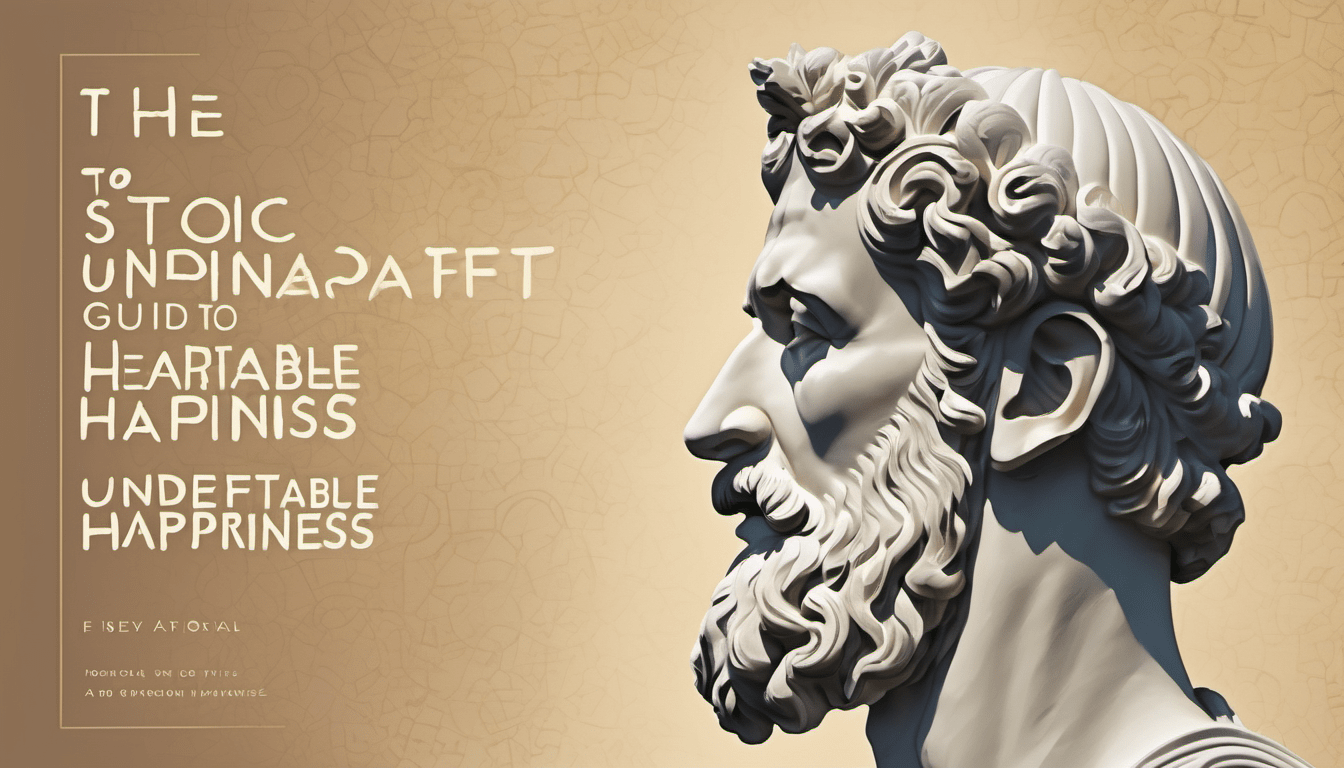
I. Introduction
A. Overview of Stoicism and its Focus on Happiness
Hey there, fellow stoics! Are you tired of the rollercoaster ride of emotions and seeking a more stable path to happiness? Look no further, because we’re about to embark on an exhilarating journey to discover the secret sauce of unshakable joy: “Stoicism: Become Undefeatable Happiness.” In a world filled with fleeting moments of contentment, Stoicism offers a beacon of enduring happiness. But how do we transform Stoic principles into a fortress of unyielding bliss? That’s the million-dollar question we’re here to tackle! Join us on this thrilling adventure as we navigate the maze of stoicism happiness, diving deep into the essence of becoming undefeatably happy.
From ancient wisdom to modern-day applications, we’ll uncover the magic behind Stoicism and the art of happiness. Get ready to crack the code to a life brimming with joy, resilience, and unwavering contentment. It’s time to embrace Stoicism and unlock the door to lasting happiness!
B. Introduction to the Concept of Undefeatable Happiness
Welcome to the realm of Stoic philosophy, where the pursuit of happiness takes on a profound and resilient form. At the heart of Stoicism lies the notion of undefeatable happiness, a state of inner contentment and tranquility that remains steadfast regardless of external circumstances. In the realm of stoicism happiness, the focus shifts from fleeting pleasures to enduring fulfillment rooted in virtue and wisdom. Stoics believe that true happiness arises not from chasing fleeting desires but from cultivating a state of mind that is impervious to life’s ups and downs.
Through the practice of stoicism become undefeatable, individuals learn to navigate life’s challenges with equanimity, finding solace in the stoicism and the art of happiness. As we embark on this journey, let us explore the timeless wisdom of Stoicism and uncover the secrets to achieving lasting happiness in the face of adversity.
C. Preview of the Stoic Approach to Achieving Lasting Happiness
Embark on a journey towards enduring happiness through the lens of Stoic philosophy, where stoicism happiness is not just a fleeting emotion but a profound state of being. Discover the transformative power of stoicism become undefeatable as we delve into the timeless wisdom of Stoicism and its profound insights into the nature of happiness. In this preview of the stoicism and the art of happiness, we’ll explore practical strategies and mindset shifts that enable individuals to cultivate a resilient inner peace, untethered by external circumstances.
From embracing adversity as an opportunity for growth to practicing gratitude and acceptance, Stoicism offers a holistic approach to achieving lasting contentment and fulfillment. Join us as we uncover the secrets of Stoic philosophy and learn how to navigate life’s challenges with grace, wisdom, and unwavering optimism.

II. The Stoic Guide to Undefeatable Happiness
A. Understanding Stoic Principles for Happiness
- Embracing Virtue as the Key to True Happiness
In the realm of stoicism happiness, embracing virtue emerges as the cornerstone for unlocking genuine and enduring contentment. Within Stoic philosophy, the pursuit of virtue, encompassing qualities like wisdom, courage, temperance, and justice, is revered as the pathway to stoicism become undefeatable in the face of life’s trials. By prioritizing the cultivation of virtuous character traits, individuals can navigate the complexities of existence with grace and resilience.
Embracing stoicism and the art of happiness entails recognizing that true fulfillment arises not from external circumstances but from the alignment of one’s actions with moral excellence. As Stoic principles emphasize, happiness is not contingent upon external events but stems from the internal harmony achieved through living a virtuous life. By embracing virtue as the key to true happiness, individuals can transcend fleeting pleasures and find lasting fulfillment in a life guided by wisdom and moral integrity.
- Cultivating Inner Resilience and Strength through Stoic Practices
In the pursuit of stoicism happiness, one of the central tenets lies in cultivating inner resilience and strength through Stoic practices. Stoicism offers a robust framework for individuals to stoicism become undefeatable by training the mind to focus on what is within one’s control and let go of what is not. Through practices such as negative visualization, premeditatio malorum, and the stoicism and the art of happiness, Stoics learn to anticipate challenges, accept the inevitability of adversity, and develop a mindset of equanimity in the face of life’s ups and downs.
By embracing these principles, individuals can cultivate a sense of inner peace and resilience, allowing them to navigate life’s challenges with grace and fortitude. Stoicism teaches that true happiness arises not from external circumstances but from the mastery of one’s own mind and emotions, making it a valuable philosophy for fostering personal growth and well-being.
B. Applying Stoic Techniques for Lasting Joy
- Practicing Mindfulness and Acceptance of External Events
In the pursuit of stoicism happiness and the quest to stoicism become undefeatable, practicing mindfulness and acceptance of external events play pivotal roles. Stoicism emphasizes the importance of recognizing that happiness is not contingent upon external circumstances but rather on one’s internal disposition. By cultivating stoicism and the art of happiness through mindfulness, individuals learn to observe their thoughts and emotions without judgment, allowing them to respond to life’s challenges with equanimity rather than reactive emotions.
Acceptance of external events, guided by Stoic principles, enables individuals to focus their energy on what they can control while gracefully accepting what they cannot. This mindset shift fosters inner peace and resilience, empowering individuals to navigate life’s highs and lows with a sense of tranquility and purpose. As a result, practicing mindfulness and acceptance becomes integral to the Stoic pursuit of lasting happiness and fulfillment.
- Developing Gratitude and Appreciation for Life’s Simple Pleasures
In the journey toward stoicism happiness and the aspiration to stoicism become undefeatable, cultivating gratitude and appreciation for life’s simple pleasures is a cornerstone of Stoic philosophy. Embracing stoicism and the art of happiness, Stoics recognize that true contentment stems from within and can be found in the ordinary moments of everyday life. By shifting focus from desires for external wealth or status to acknowledging and cherishing the present moment, individuals can unlock a profound sense of fulfillment.
Whether it’s relishing a warm cup of coffee in the morning, enjoying a leisurely stroll in nature, or spending quality time with loved ones, practicing gratitude fosters a deeper connection to life’s inherent joys. Through this lens of appreciation, Stoics find resilience in the face of adversity, anchoring themselves in the abundance of the present moment rather than dwelling on past regrets or future uncertainties.
- Embracing Stoic Virtues such as Wisdom, Courage, Temperance, and Justice
In the pursuit of stoicism happiness and the quest to stoicism become undefeatable, embracing Stoic virtues such as wisdom, courage, temperance, and justice is paramount. These virtues serve as guiding principles that lead individuals toward a life of fulfillment and contentment, aligning with the essence of stoicism and the art of happiness. Wisdom encourages thoughtful reflection and discernment, empowering individuals to navigate life’s challenges with clarity and insight. Courage enables one to face adversity with resilience and fortitude, overcoming obstacles on the path to personal growth.
Temperance promotes moderation and self-control, fostering balance and harmony in all aspects of life. Justice inspires fairness and integrity, guiding actions toward the greater good of society. By embodying these virtues, individuals cultivate inner strength and moral character, laying the foundation for lasting happiness and fulfillment.
- Finding Purpose and Meaning in Adversity through Stoic Philosophy
Amidst life’s challenges, stoicism happiness and the pursuit of stoicism become undefeatable are not only attainable but profoundly enriched through Stoic philosophy. Stoicism, with its focus on inner resilience and mental fortitude, offers a unique perspective on finding purpose and meaning in adversity. By embracing Stoic principles, individuals can navigate difficult circumstances with grace and resilience, transcending setbacks to discover profound stoicism and the art of happiness.
Stoicism teaches that challenges are opportunities for growth and learning, allowing individuals to cultivate inner strength and wisdom amidst turmoil. Rather than being defeated by adversity, Stoicism encourages individuals to find purpose and meaning in their struggles, empowering them to emerge stronger and more resilient than before. Through Stoic philosophy, individuals can transform adversity into a source of growth and fulfillment, ultimately leading to lasting happiness and inner peace.
C. Overcoming Obstacles to Happiness
- Addressing Common Misconceptions and Challenges in Pursuing Stoic Happiness
In the pursuit of stoicism happiness and the quest to stoicism become undefeatable, individuals may encounter common misconceptions and challenges surrounding Stoic philosophy. One prevalent misconception is that Stoicism promotes emotional detachment or suppression, but in reality, Stoicism encourages acknowledging and understanding emotions while striving for inner tranquility. Another challenge is the misconception that Stoic happiness is passive acceptance of circumstances, whereas it involves active engagement and intentional cultivation of virtues.
By addressing these misconceptions, individuals can better appreciate Stoicism’s profound insights into stoicism and the art of happiness. Stoicism provides practical tools and techniques for navigating life’s challenges while fostering resilience and inner peace. Embracing Stoic principles empowers individuals to face adversity with courage, wisdom, and grace, ultimately leading to a deeper sense of fulfillment and contentment. Through education and practice, individuals can overcome misconceptions and embrace Stoicism as a path to lasting happiness and well-being.
- Dealing with Negative Emotions and Thoughts in a Stoic Manner
In the journey towards stoicism happiness and striving to stoicism become undefeatable, mastering the art of dealing with negative emotions and thoughts in a Stoic manner is paramount. Stoicism emphasizes the importance of acknowledging negative emotions without being consumed by them. Instead of suppressing or avoiding these feelings, Stoics advocate for a rational approach by examining the root causes and reframing them in a more constructive light.
By practicing mindfulness and stoicism and the art of happiness, individuals can cultivate a sense of detachment from external events and focus on what lies within their control. Stoic techniques such as negative visualization and premeditatio malorum help individuals prepare for challenges and develop resilience in the face of adversity. Through consistent practice and application of Stoic principles, individuals can transform negative emotions into opportunities for growth and self-improvement, ultimately leading to a more fulfilling and contented life.
- Strategies for Maintaining Stoic Happiness Amidst Life’s Ups and Downs
In the journey to achieve stoicism happiness and embody the essence of stoicism become undefeatable, it’s vital to employ effective strategies for maintaining happiness amidst life’s fluctuations. One fundamental aspect is embracing stoicism and the art of happiness through a shift in perspective. Stoic philosophy teaches us to focus on what is within our control, emphasizing internal virtues over external circumstances. By cultivating virtues like gratitude, resilience, and acceptance, individuals can navigate life’s challenges with grace and fortitude.
Moreover, practicing mindfulness techniques, such as meditation or journaling, can help foster inner peace and emotional stability. Stoicism encourages us to acknowledge our emotions without letting them dictate our actions, empowering us to respond to adversity with wisdom and composure. Through consistent application of Stoic principles, individuals can cultivate a deep sense of contentment and fulfillment, regardless of external circumstances.

III. Conclusion
A. Recap of Key Points from the Stoic Guide to Undefeatable Happiness
In summary, the Stoic approach to happiness emphasizes cultivating inner virtues and resilience to achieve undefeatable contentment. By embracing stoicism and the art of happiness, individuals can find fulfillment regardless of external circumstances. Key strategies include practicing mindfulness, cultivating gratitude, and embracing stoic virtues such as wisdom and courage. Through these practices, individuals can navigate life’s ups and downs with grace and composure, finding strength in adversity and maintaining a sense of peace and contentment. Ultimately, Stoicism offers a timeless philosophy that empowers individuals to find lasting happiness from within, independent of external factors.
B. Encouragement for Readers to Embrace Stoic Principles and Cultivate Lasting Happiness
Embracing stoicism and the art of happiness can transform lives, offering a path to undefeatable contentment amidst life’s challenges. By incorporating stoic principles into daily life, individuals can cultivate resilience, inner peace, and a sense of fulfillment. Remember, stoicism is not about suppressing emotions but rather about acknowledging them and choosing how to respond with wisdom and clarity. By practicing mindfulness, embracing gratitude, and nurturing stoic virtues, such as courage and temperance, readers can embark on a journey towards lasting happiness. So, why not start today? Embrace stoicism and unlock the keys to a more fulfilling and meaningful life.
C. Invitation to Explore Further Resources on Stoicism and Happiness
Ready to dive deeper into the realm of stoicism and happiness? Explore further resources to enrich your understanding and practice. From classic texts by ancient stoic philosophers to modern interpretations and practical guides, there’s a wealth of knowledge waiting to be discovered. Online communities, podcasts, and workshops also offer valuable insights and support on your journey to becoming undefeatable in happiness. Remember, stoicism is not just a philosophy but a way of life, guiding us to find tranquility and joy amidst life’s challenges. So, grab a book, join a discussion, or listen to a podcast, and embark on your quest for stoic wisdom and happiness.
FAQs
- What is Stoicism?
Stoicism is an ancient philosophy founded in Athens by Zeno of Citium around the early 3rd century BCE. It emphasizes the development of self-control and fortitude as a means of overcoming destructive emotions and finding inner peace. - How can Stoicism contribute to happiness?
Stoicism teaches individuals to focus on what they can control, accept what they cannot, and cultivate virtues like wisdom, courage, and temperance. By adopting a Stoic mindset, individuals can find greater contentment, resilience, and fulfillment in life. - Can anyone practice Stoicism?
Yes, Stoicism is accessible to anyone regardless of background or belief system. Its principles can be applied universally, offering practical guidance for navigating life’s challenges and pursuing happiness. - Is Stoicism about suppressing emotions?
No, Stoicism is not about suppressing emotions but rather understanding and managing them effectively. It teaches individuals to acknowledge their emotions without being ruled by them, fostering emotional resilience and well-being. - How can I incorporate Stoic principles into my daily life?
You can start by practicing mindfulness, focusing on the present moment, and reflecting on Stoic teachings regularly. Additionally, applying Stoic virtues such as wisdom, courage, justice, and temperance in your actions and decisions can help cultivate a happier and more fulfilling life.







